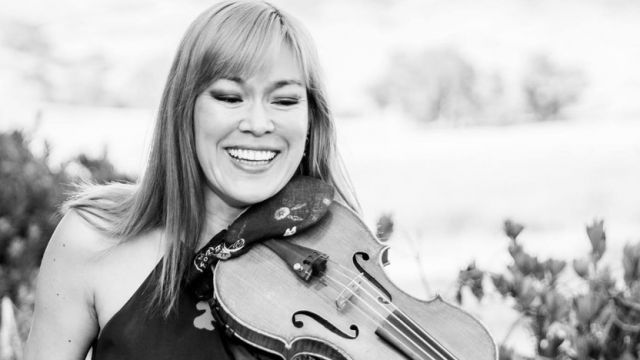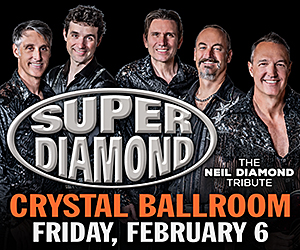Home > Home - Featured
06/20/2018
Astoria Music Festival kicks off the season with French chamber music
By HOLLY JOHNSON // Astoria Music Festival’s 16th season opened with Gallic charm last Friday.
Astoria Music Festival’s 16th season opened with Gallic charm last Friday. Four luminous selections by French composers through time filled the charming renovated Liberty Theater. It was a short evening, comprised of short pieces in the first half, but chamber music at its most beguiling. The only disturbing thing was the small audience. Dare I say this would have been a great way to give your kids a taste of classical music in a casual setting; and with only three instruments to follow—cello, violin and piano—it might have been more accessible, more personal for them than the sound of a full orchestra. They would have taken in lullabyes, fireworks, and more.
No tuxedos and glittery gowns here. The three musicians, Cary Lewis on piano, violinist Maureen Nelson and festival favorite cellist Sergey Antonov wore comfortable daytime clothes, Only Nelson added a touch of glamour in a shoulder-revealing top and flowing trousers. But when the music filled the hall, Astoria’s prize vintage building—it was a class act.
The group led with a mystery piece by one Jean-Baptiste Loeillet. According to Lewis, who introduced each selection, there was more than one composer by that name in the late 17th-early 18th century, and their works weren’t always identified as to who wrote what. Whatever the case, the work flirted with both Romanticism and the baroque (I heard a touch of Bach), and was an evening highlight. After a stately cello opening, canonic phrases between the two string instruments hovered in the lower range, creating a lush effect. All three revealed marvelous timing in the bright, final allegro movement, with sharp, sparkling keyboard work echoing the fast-paced strings.
Debussy’s Sonata for Piano and Cello from 1915 followed, with violin replacing the cello here. The piece runs around 11 minutes, but is considered one of the finest masterpieces written for the cello, and influenced by the music of Francois Couperin. With quicksilver bowing and great flexibility and playfulness in the first allegro movement particularly, Nelson, a member of the St. Paul Chamber Orchestra, aptly demonstrated how the work suits the violin. Dipping into her instrument, eyebrows raised, her ponytail flying, Nelson filled the piece with drama. She’d swoop, sway then stand stock still: Though created for cello, the work in Nelson’s magic hands proved to be a great showcase for the fiddle. This was a dazzling piece, though a brief one, and Nelson dug into it with passion and whimsy.
Poulenc’s Sonata for Piano and Cello (composed over eight years in the 1940s) was a tamer offering. I’m a great fan of Poulenc’s wit, lush musicality and romantic phrasing, and this piece, with Antonov performing beautifully, contained those signature elements. To me, Poulenc should have written music for animation, for film, for people dancing down the street in Paris rain, but that’s besides the point. This sonata is not his strongest piece: Yet his earmarks are there: It’s mysterious, sweet, playful, angular. Trickster and urban sophisticate, Poulenc seems to hold back in this composition, but it was highly enjoyable nonetheless.
The final selection in the second half was Saint Saen’s Trio No. 1 in F Major (1863), featuring some excellent playing by Lewis, but with all three musicians worked smoothly together, one finishing another’s musical sentence, at times. As Lewis put it in his introduction, “This is really happy music. Just sit out there and be happy.
There’s such a richness to this trio, with its lush harmonies and spirited pizzicato. The second movement, with its sober drone like opening leads eventually to music inspired by French folk tunes with a hurdy-gurdy sound. The three musicians filled the hall with delicacy, flambuoyancy, dazzling string arpeggios, and percussive piano.
The Astoria Music Festival runs through July 1, offering a plethora of programs, including two operas, dance, film, chamber music and symphonic programs at various venues.








